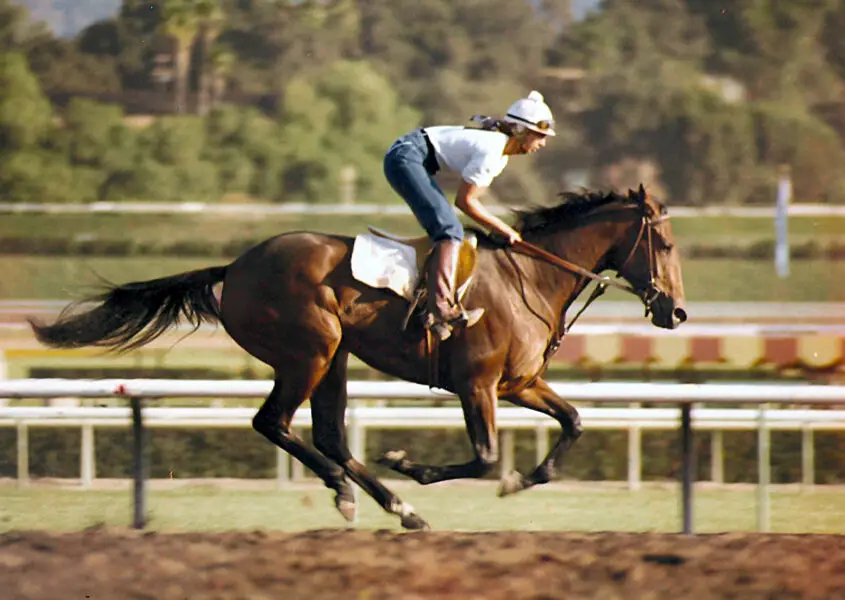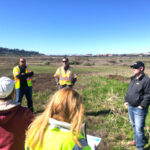DEL MAR — Del Mar Racetrack has seen plenty of ups and downs in the last few years, a reflection of the horse racing industry as a whole.
Despite hosting the prestigious Breeders’ Cup and a record-setting Opening Day handle, Del Mar’s stream of horse fatalities, mounting debt, unyielding opposition from animal rights activists and devastating impacts of the COVID-19 pandemic has put the business of horse racing in a fragile position.
But Del Mar is only one of many players in a statewide game. Every California racetrack is facing a growing chorus of protests from both sides of an argument that includes animal rights, workers’ rights, horse drugging and horse betting.
Coupled with possible changes to state law, the industry’s future stands very unclear.
In 2019, the criticism of the sport reached its peak following 23 horse fatalities at Santa Anita Park within a span of just three months, which prompted an investigation by the California Horse Racing Board (CHRB). The investigation, however, found no overriding reason for the spike other than pre-existing conditions, as is the case with most horse fatalities.
Since then, horse fatalities have dramatically decreased, according to a report by the CHRB, which shows a 26% reduction from 2020 and nearly a 45% drop from 2019.
But animal rights groups aren’t convinced. A petition started by advocacy group Kill Racing Not Horses has garnered almost 1,200 signatures in its effort to ban the practice of betting on horses, which would effectively end horse racing.
Martha Sullivan, a San Diego resident and an organizer of the group, said horse racing harms horses in a way that no other sport harms its athletes, adding that it’s impossible to justify given the declining industry.
 Jockey Martin Garcia rides “Secrets at Midnight” in 2013 at Santa Anita Park. Racing enthusiasts argue eliminating the industry would have dire economic consequences. Courtesy photo
Jockey Martin Garcia rides “Secrets at Midnight” in 2013 at Santa Anita Park. Racing enthusiasts argue eliminating the industry would have dire economic consequences. Courtesy photo
“The volume of bets on horse racing has dropped like 50 percent in the last 20 years [nationally],” Sullivan said. “It’s increasingly not a viable industry. We don’t need it anymore…because the lottery and the casinos have completely obliterated what horse racing used to be. Animals should not be suffering for an industry that really doesn’t provide much benefit to California any longer.”
But California voters might soon say otherwise. This November, Californians may be asked to vote on as many as four sports betting initiatives, including one that has already qualified for the state ballot that would add sports wagering (in-person only) at tribal casinos and horse racing tracks.
Proponents of the bill argue that “horse racing represents one of the oldest forms of wagering, existing in California for almost a century,” with more than $3 billion wagered each year, according to the California Horse Racing Board.
“In 2016, Indian gaming in California, directly and indirectly, generated the following total economic and fiscal impacts on the California economy: 124,300 jobs; $20 billion in output; $9 billion in wages to employees; $3.4 billion in taxes and revenue sharing payments to federal, state, and local governments, including nearly $1 billion to the State of California and $378 million to local governments,” the ballot language reads.
California_Legalize_Sports_Betting_on_American_Indian_Lands_InitiativeIn May 2021, the California Secretary of State reported 1,061,282 valid ballot signatures — 64,143 more than required to appear on the Nov. 8 general election ballot.
Racetracks across the country have steadily lost customers in recent years due to the widespread popularity of online gambling. Traditional bettors have started to migrate away from the track toward locales offering slot machines and casino-style table games, in addition to sports gambling services and off-track betting.
According to a New Jersey Star-Ledger article, daily attendance at the Meadowlands Racetrack in New Jersey averaged a daily crowd of fewer than 3,000 visitors in 2019, down from 16,500 in the track’s first year of operations.
However, this past summer, Del Mar Racetrack set an Opening Day handle record with over $20 million in bets made and totaled $80,517,984 over the three-day weekend. In November, the track hosted the Breeders’ Cup with a total attendance of 47,089, despite a reduced ticket capacity due to COVID-19. The two-day event saw a total all-sources common-pool handle of $182,908,409 — a Breeders’ Cup record.
But while the recent numbers are encouraging, on-track attendance at the seaside oval has declined over the last decade. As of 2019, on-track attendance has dropped 36% from a recent high in 2014, and 45% since an all-time high in 1987, according to stats from the Del Mar Thoroughbred Club’s 2020 Media Guide.
While some animal rights groups argue since there isn’t as much public interest or money in horse racing anymore, the primary claim from opponents involves equine health and safety amidst horse doping, an illegal practice of using performance-enhancing drugs on racehorses.
Just last week, a federal horse doping conspiracy trial got underway against Dr. Seth Fishman, Lisa Giannelli and more than two dozen trainers, veterinarians and other defendants, in the “most far-reaching prosecution of racehorse doping in U.S. Justice Department history.”
The defendants allegedly operated a black-market drug conspiracy for two decades, creating hundreds of performance-enhancing drugs that were being used to secretly drug horses.
According to the equine medical director at the Kentucky Horse Commission, some racehorses are being given micro-doses of recombinant human erythropoietin, known as blood doping, which stimulates red blood cells and allows more oxygen to the muscles.
More locally, Dr. Jeff Blea, CHRB equine medical director, has been placed on administrative leave by UC Davis pending a formal review of his veterinary license due to a number of alleged offenses including administering “dangerous drugs” to racehorses without examination, diagnosis or medical necessity.
This week also marked the beginning of the disciplinary hearing for Hall of Fame trainer Bob Baffert for seven alleged drug violations by Baffert-trained horses since July 2019.
Michael Beychok, one of the most well-known players in horse betting, is the leading figure in a class-action lawsuit against Baffert. Beychok, who lives in Los Angeles, said he would have made money on the 2021 Kentucky Derby had it not been won by Medina Spirit, Baffert’s horse who tested positive for illegal drugs after taking first place.
Beychok told The Coast News that he’s taking a big step back from horse betting until he sees some reform.
“I’m just tired of seeing horses drugged over race day limits to win races and damage the reputation of horseracing,” Beychok said. “I think it’s damaging the trust that has been built over the years that horseracing is going to offer a fair wager.”
While horses should not be dying at the rate seen under Baffert’s care, Beychok said putting an end to horseracing is not the answer.
“I don’t think horseracing is inhumane at all. I don’t agree with those people that have called for ending horseracing… these horses, they love to race – that’s what they’re bred to do, and we can do it without drugging them,” Beychok said.
Oscar De La Torre, a workers’ rights advocate based in Santa Monica, also opposes the animal rights activists’ efforts to end horse racing, but for different reasons.
 Marla Zanelli, a Solana Beach resident and former assistant trainer, rides a racehorse at Santa Anita Park at the age of 26. Photo courtesy of Marla Zanelli
Marla Zanelli, a Solana Beach resident and former assistant trainer, rides a racehorse at Santa Anita Park at the age of 26. Photo courtesy of Marla Zanelli
De La Torre, whose uncle used to be a backstretch worker at Hollywood Park before it closed down in 2013, has witnessed firsthand the devastating impact that a racetrack closure has on its workers. He described watching his uncle, who thought he was on a path to becoming a trainer, struggle to find work and to transfer the only skills he knew and completely start over.
De La Torre noted that one racetrack can have up to 800 backstretch workers, who are all provided with dorm-style housing, medical benefits, food and more as part of their compensation.
“For these privileged animal rights extremists, animal welfare is a higher priority than the economic well-being of the largely immigrant Latinx workers in the horse racing industry,” De La Torre said. “If you want to get rid of an entire industry, there are consequences to that. What happens to all the vulnerable workers who will lose their jobs in the middle of a pandemic with a homelessness crisis and with rent being as high as it is?”
De La Torre also noted that no one knows better than these backstretch workers how well these horses are being taken care of.
“If they cared about animal rights, how come they’re not here with us at four in the morning, taking care of these horses? Instead of picking up a picket sign and trying to rip people’s livelihood away, they should go pick up a bucket and come help these hard-working people take care of the horses that are helping provide for them,” De La Torre said.
Marla Zanelli, a Solana Beach resident who was an exercise rider and assistant trainer for 20 years, said horses are the best cared for animals in the world and eliminating horse racing would take them away from what they are bred to do.
“These are magnificent creatures that love to race,” Zanelli said. “I think the industry has done an amazing job to correct things and to continue to bring us this incredible sport that brings people together, that helps the economy and that provides hundreds of thousands of jobs.”




2 comments
Yes Sanbury, agree! Martha Sullivan and her group are extremists and animal haters and they don’t even realize it.
Keep horse races. Lose cheaters. 1,200 signatures not mandate. 6 protesters not a story.
Comments are closed.